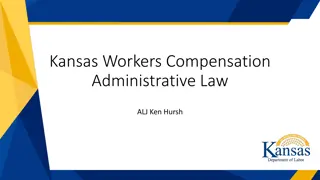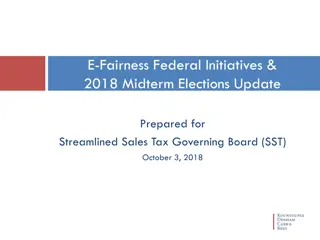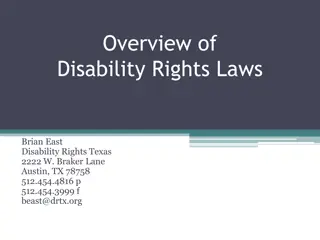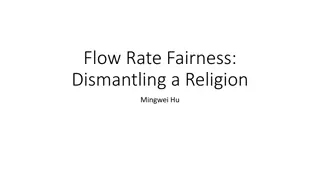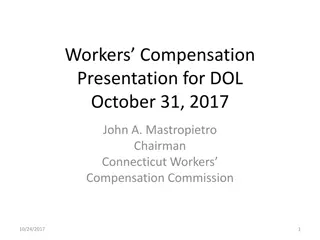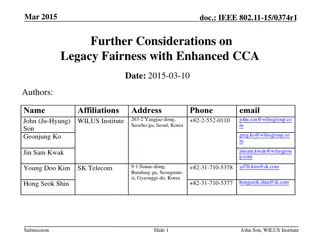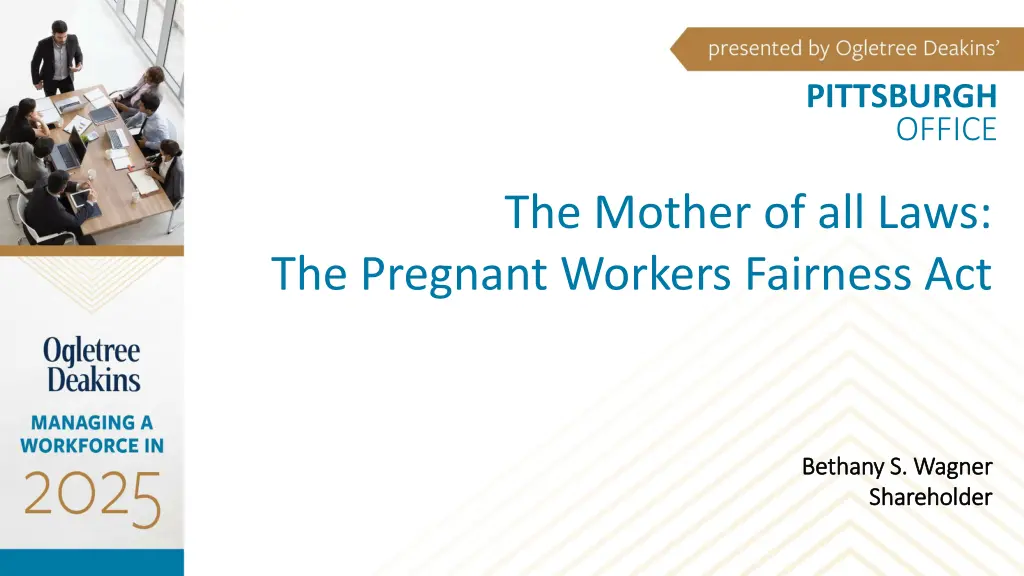
Understanding the Pregnant Workers Fairness Act and Accommodations
Learn about the Pregnant Workers Fairness Act (PWFA) which requires accommodations for pregnant employees without undue hardship. Explore the essential provisions, companion legislation like the PUMP Act, unlawful actions under PWFA, and insights from EEOC cases. Stay informed about workplace obligations and rights regarding pregnancy-related accommodations.
Download Presentation

Please find below an Image/Link to download the presentation.
The content on the website is provided AS IS for your information and personal use only. It may not be sold, licensed, or shared on other websites without obtaining consent from the author. If you encounter any issues during the download, it is possible that the publisher has removed the file from their server.
You are allowed to download the files provided on this website for personal or commercial use, subject to the condition that they are used lawfully. All files are the property of their respective owners.
The content on the website is provided AS IS for your information and personal use only. It may not be sold, licensed, or shared on other websites without obtaining consent from the author.
E N D
Presentation Transcript
PITTSBURGH GREENVILE OFFICE OFFICE The Mother of all Laws: The Pregnant Workers Fairness Act Bethany S. Wagner Bethany S. Wagner Shareholder Shareholder
The Pregnant Workers Fairness Act Law became effective on June 27, 2023 EEOC Regulations effective June 18, 2024 Fills in the gaps left by Title VII and ADA Hot topic: Approximately 2000 charges filed with the EEOC (most on failure to accommodate or delaying accommodation)
The Pregnant Workers Fairness Act Requires that reasonable accommodations be provided to a qualified employee s or applicant s known limitations related to, affected by, or arising out of pregnancy, childbirth, or related medical conditions, absent undue hardship on the operations of the business. Goal is to keep employees working by providing workplace accommodations (unless employee specifically requests leave, i.e. prenatal appointments, morning sickness). Case-by-case analysis Companion legislation to PUMP Act Must provide reasonable break time each time needed Private space to express breast milk through child s first year. Not a bathroom, shielded from view, free from intrusion
PWFA Companion legislation to Providing Urgent Maternal Protections for Nursing Mothers Act (PUMP Act). Expands existing employer obligations for workplace lactation accommodation. In reasonable proximity to the employee s usual work area; Regularly cleaned; Have electricity, appropriate seating, and a surface sufficient to place a breast pump; In reasonable proximity to a sink, running water, and a refrigerator for storing milk; and If designated space is shared, must give lactation priority.
Whats Unlawful Under the PWFA? Refusing or failing to accommodate (absent undue hardship) Unnecessary delays in providing accommodation Denying accommodation based on lack of documentation, unless Requiring employee to accept accommodation not arrived at through interactive process Denying equal employment opportunities based on need for accommodation Requiring employee to take leave if working accommodation would not be undue hardship Taking adverse action based on request for/use of reasonable accommodation (retaliation)
Insights from the EEOC (Cases and Settlements) Issuing attendance points to attend prenatal appointments Failure to accommodate extra breaks and sitting during work Failure to allow work on a part-time basis during final trimester Terminating employee for requesting lactation breaks Terminating employee after requesting leave to recuperate from a stillbirth Failure to reinstate employee after leave for birth
Insights from the EEOC (Cases and Settlements) Putting employee on unpaid leave instead of accommodation Using ADA paperwork for PWFA Asking for supporting documentation when need for accommodation is obvious Not permitting accommodation to attend monthly pregnancy-related appointments Requiring mandatory overtime despite HCP restriction limiting to 40 hours a week
PWFA Regulations: Some things look familiar Title VII and ADA coverage Employee (includes applicants and former employees) Covered employers (private and public sector employers w/15+ employees) Reliance on some ADA processes Notice from employee Employer obligation to promptly engage in interactive process Reliance on some ADA principles Undue hardship Essential job functions Interactive process Reasonable accommodation Individualized assessment Qualified individual Mitigating measures
some things look new or different. Types of related medical conditions Alternative definition of qualified and temporary suspension of essential functions Explicitly requires access to light duty programs Predictable assessment accommodations Limits on documentation requests Leave how/when leave is used
Related Medical Conditions Broad list includes: Infertility and fertility treatments Past pregnancy Endometriosis Birth control use Miscarriage and stillbirth Postpartum depression Post-pregnancy limitations or complications that are a consequence of pregnancy Menstruation Having or choosing not to have an abortion Lactation (and conditions related to lactation, such as low milk supply, mastitis, etc.)
Alternative Definition of Qualified Individual Unlike the ADA, employees/applicants are qualified even if they cannot perform one or more essential functions of the job, provided: The inability to perform the essential function(s) is temporary; The essential function(s) could be performed in the near future; and The inability to perform the essential function(s) can be reasonably accommodated.
Alternative Definition of Qualified Individual In the near future = within 40 weeks of inability Can be triggered more than once Does not count time where the employee is on leave for a covered condition An employee is not required to accept an accommodation, but is no longer qualified if the employee rejects an accommodation necessary to enable the employee to perform the essential functions of the job and therefore cannot perform the essential function, or rejects the temporary suspension of an essential function.
The (not so near?) Future In the near future Case-by-case analysis. For pregnancy, generally within 40 weeks of inability. For non-pregnancy, time period based on individualized assessment (reasonable). Can be triggered more than once. Does not count time where the employee is on leave for a covered condition.
Light Duty Program Access Hand in hand with requirement that suspension of essential functions can be a reasonable accommodation In no uncertain terms, the regulations say covered employees are entitled to placement in light duty programs, even if offered only for on-the-job injuries What if light duty is not offered to anyone? Must still consider whether light duty work can be provided as an accommodation under the PWFA
Interim Reasonable Accommodations Best practice to provide, especially in urgent or unforeseeable situations. Regular interactive process can continue. Unnecessary delay may violate the PWFA, even if the company eventually provides the accommodation.
Predictable Assessment Reasonable Accommodations The regulations state that employers should grant some accommodations in virtually all cases. Will rarely be an undue hardship. No supporting documentation or extensive individualized assessment.
Predictable Assessment Reasonable Accommodations (cont d) Allowing an employee to carry water and drink in the work area Allowing additional restroom breaks Allowing sitting in jobs that require standing, and standing in jobs that require sitting Allowing breaks as needed to eat and drink (Arguably) Time, place, and manner of lactation
Cumulative Effect and Undue Hardship Employer cannot base undue hardship on concern that other employees might ask for a reasonable accommodation or the same one in the future.
Additional Lactation Accommodations PWFA requires lactation accommodations beyond PUMP Act Lactation area must be in reasonable proximity to the employee s usual work area; regularly cleaned; have electricity, appropriate seating, and a surface sufficient to place a breast pump; and in reasonable proximity to a sink, running water, and a refrigerator for storing milk. Accommodations related to lactation may also include nursing where the regular location of the employee s workplace makes nursing during work hours a possibility because the child is in close proximity.
Limits on Documentation Requests Reasonable documentation defined as describing or confirming: The physical or mental condition; Is affected by pregnancy, childbirth, or related condition(s); and That a change or adjustment at work is needed for that reason Unreasonable request examples Where pregnancy or accommodation is obvious Where the employer already has the information Predictable assessments Certain lactation-related accommodations Regulations strongly encourage interim accommodations pending receipt of documentation Health care provider includes doula and lactation consultant
Related Considerations Note you cannot require use of PWFA reasonable accommodation forms, but can encourage. Cannot require an employee to accept an accommodation other than one arrived at through the interactive process. Review state and local pregnancy accommodation laws/ordinances. Make sure you are using current EEO poster that includes PWFA.
PWFA Interaction With Other Leave Laws Other laws include FMLA, ADA, state/local leave laws Also consider employer-provided leave Cannot mandate use of paid leave for PWFA leave unless mandated for all other forms of leave Consider overlapping protections and provide the one that is most protective of the employee PWFA leave is an accommodation outside of the FMLA if it applies Employers should continue to designate FMLA leave where applicable Can consider time provided under the FMLA as part of the undue burden analysis on additional leave as a PWFA accommodation
Penalties for Non-Compliance Incorporates damages provision applicable to Title VII claims Back pay, reinstatement, compensatory and punitive damages (subject to caps), attorney s fees and costs For claims involving the provision of a reasonable accommodation, employer may assert good faith defense to award for compensatory and punitive damages Means engaging in the interactive process and demonstrating good faith efforts in consult with employee to identify and make a reasonable accommodation Overlapping laws may provide additional/different damages, e.g., PUMP Act and FMLA




